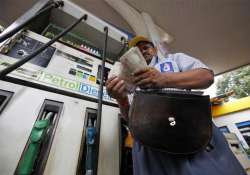Half your fuel bill is in taxes but governments still ravenous
Despite the crash in the global prices of crude oil, the consumers are being denied a decent and deserving cut in their transport fuel bills with the government and oil retailers preferring to pocket the

Despite the crash in the global prices of crude oil, the consumers are being denied a decent and deserving cut in their transport fuel bills with the government and oil retailers preferring to pocket the bulk of the windfall.
Since March 2012, the prices of benchmarked crude oils that Indian refineries import have crashed as much as 76 percent -- from a peak of $123.61 per barrel to $29.24 now. In contrast, prices of petrol, in the case of the national capital, have been cut by just 18.9 percent, while that for diesel is up 10.1 percent.
True, the diesel prices as in March 2012 involved an extent of under-recovery for the refineries, which was Rs.13.10 per litre. Nonetheless, adding this to prices prevailing then the retail price ought to have worked out to around Rs.54.01.
Using this as the base, the present cut then would translate into 16.6 percent since then, which is again way below the quantum of the crude oil prices crash.
In fact, under-recovery -- or losses suffered by oil retailers on account of selling diesel at below cost -- was Rs.8.37 per litre as on March 1, 2014. But by September last year, when this fuel was de-controlled, it had turned positive, peaking to Rs.3.56 a litre as on October 16.
Experts will argue that this is too simplistic a benchmark, since pricing of petroleum fuels is a complex subject, involving a host of variable factors, such as central excise duties, state sales taxes and marketing bonus, besides global crude prices, fixed costs and refining margins.
We will address that as well, using data with the state-run Petroleum Planning and Analysis Cell.
Among the seemingly intangible benefits from oil prices' crash accrue to the country's external sector. India's oil import bill in the first eight months of this fiscal has declined sharply by 42.39 percent to $61.41 billion from $106.59 billion during the like period of last fiscal.
This means the country has conserved $45 billion thus far in foreign exchange. This has certainly helped the central bank to have a better cushion to keep the Indian rupee's exchange rate stable -- a feat it has managed better than some of the other Asian peers with their currencies.
Where the government -- and in some cases those in states as well -- played spoil-sport is by hiking the levies. In January, the excise on petrol was hiked by 37 paise and diesel by Rs.2 per litre. This closely followed a hike of 30 paise and Rs.1.17 respectively, in mid-December.
Why is this unjustified?
For one, the central government levies specific excise duty on petrol and diesel, as opposed to an ad valorem rate. This means, even if crude oil prices fall or go up there is no real loss or gain to the exchequer, even if the retail prices of these two transport fuels are altered.
As per calculations available as on January 2 with Bharat Petroleum, the specific excise duty of the central government was Rs.19.73 per litre for petrol and Rs.13.83 per litre for diesel -- a rather high figure.
In addition, the states, too, have played their part in denying people a fair price of transport fuels. In Delhi for example the sales tax is 25 percent for petrol and 17.39 percent for diesel. In the case of Andhra Pradesh, it is as high as 39.83 percent and 33.09 percent, respectively.
This means, in the national capital, against the price of around Rs.60 per litre for petrol that one pays, more than 50 percent, Rs.31.65 per litre, is towards excise and sales tax. For diesel, Rs.20.50 per litre (45 percent) is towards these two levies, against the retail price of Rs.45.
The excise duty of the central government is: Rs.7.73 towards basic Cenvat duty, Rs.6 for special additional excise and another Rs.6 as additional excise. For diesel, it is Rs.10.19, nil and Rs.6 per litre, respectively. Sales tax varies with each state, Andhra Pradesh charging the highest.
At the larger level, the government will look at every possible avenue to raise resources to keep its fiscal deficit promises, since the divestment programme has gone awry once again. This leaves little hope for consumers to benefit from the present bouts of oil prices crash globally.
In the last fiscal, the central government had raised the excise duties by a total of Rs.7.75 per litre on petrol and Rs.6.50 per litre on diesel in four instalments between November and December to garner Rs.20,000 crore as additional money.
This fiscal year, there have been three such increases thus far, again since November, totalling Rs.2.27 per litre towards petrol and Rs.3.57 per litre on diesel to fetch around Rs.10,000 crore as extra revenue mop-up.
All eyes will now be on January 16 when the bi-monthly revision of transport fuel prices by the oil marketing companies is due. While there is ample scope for a cut in retail prices, the moot point is: Will the government hold its horses on excise hikes this time?